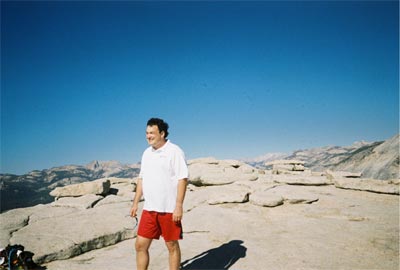The ultimate solution to global warming: emigrationby Sam Dinkin
|
| Well before our waste heat generation hits the level of solar flux, all growth in ambient heating will have to occur off Earth to prevent the Earth from becoming much, much hotter. |
If energy growth continues, our waste heat level will hit the level of solar flux in a little over 300 years. Most population economists think that population growth will slow down as the whole world can afford family planning and can support themselves through their old age without kids. I think this is a temporary bump. As the world gets richer, people will want more planned kids and population growth will take off again when we hit that income level. That is, the fertility curve of fertility vs. income is U-shaped. But even if population stops growing, our waste heat level will hit the level of solar flux in less than 2,000 years. Long before waste heat surpasses the Sun in our budget, it will be a bigger problem than carbon dioxide.
Well before our waste heat generation hits the level of solar flux, all growth in ambient heating will have to occur off Earth to prevent the Earth from becoming much, much hotter. I have no doubt humanity will adapt to the heat problem, but ultimately, more and more activity will take place off Earth.
When waste heat is equal to solar flux, we will have to either reflect all sunlight back into space, increase the Earth’s emissivity or pump the heat into the Earth’s core. I foresee fountains of molten salt broadcasting our heat into the sky. But economic growth will outpace our increase in emissivity by moving people and industry off Earth.
It will be easy for families to move off Earth. Per capita GDP will be about 1,000 times what it is today and the median family will be able buy a ticket off of Earth at today’s prices. With the kind of spaceflight demand emanating from a world of people earning an average of $6 million/year in today’s dollars, the price of a ticket to space should be much lower than today long before there is any need to emigrate.
We have an obligation to our (great)n grandkids. Not to leave them a clean balance sheet: they will be far richer than we. Not to leave them an unspoiled Earth: they will have no trouble cleaning up our messes. Our obligation is to lay the foundation for the continued growth of their welfare. An investment in how to pioneer space now will allow them to make oases in the vast lifeless, waterless, airless—cool—desert of space. Our forethought will help our descendants be able to settle the oases much as 17th century pioneers helped enable my great grandparents to easily leave Europe for New York in the first decade of the 20th century.
| The world will end in fire: the fire of the rocket exhaust of people leaving for cooler climates. |
Solving global warming by reducing fossil fuel carbon emissions looks backward and down. Instead, look forward to raising carbon emissions and sequestering carbon. Look forward to more energy use and energy services for everyone. Look beyond to the next big global heat problem. Look up to see how space settlement can solve it. Raising our eyes from the ground to the horizon and beyond will allow us to focus on optimizing the future after we have secured it. I want to bequeath to my daughter the knowledge that humanity can live and thrive soon throughout the solar system. And, not too much longer after that, in the rest of the universe eternally.
When I was a kid, I worried about global climate change, nuclear war and population explosions. I want to retire the risk of humanity dying from all global disasters. I want to retire the risk of humanity becoming unchanging. It’s only a matter of time.
The world will end in fire: the fire of the rocket exhaust of people leaving for cooler climates. People on Earth won’t die. They will stay and manage the fiery Earth comfortably. But space settlement, the new beginning forced on us as the ultimate solution to global warming, may commence sooner than you think.
